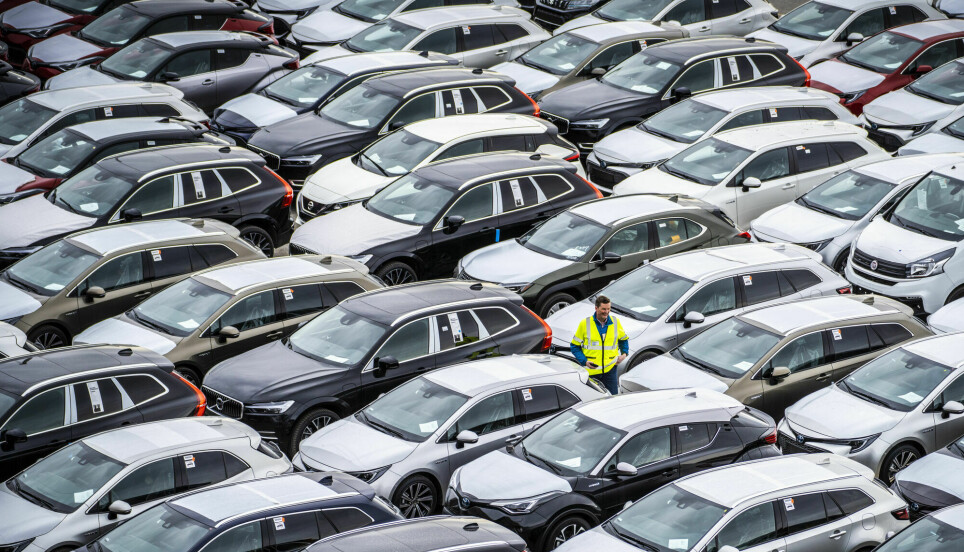
What’s best for the climate, buying a new electric car or driving your old petrol car into the ground?
The answer depends on how the emissions are calculated, it turns out. And here the experts disagree.
Driving a petrol car for more of its useful life can reduce CO2 emissions significantly more than switching to an electric car.
That’s what Japanese researchers have newly concluded.
“The faster you replace a car, the more CO2 it emits. This is also true for electric cars,” Shigemi Kagawa, a professor at Kyushu University in Japan said in a press release.
But Norwegian researchers disagree, especially when it comes to one thing: The location of where the greenhouse gases from the car are emitted.
Electric cars are more than just lower fuel consumption
The Japanese argue that the CO2 footprint of a car is much more than just the petrol it uses.
To make electric cars, you need raw materials like iron, manufactured materials like nuts and bolts and glass, factories to assemble them, and mega containers to transport them.
And you also need batteries. Big batteries.
All these links in the production chain result in CO2 emissions.
That’s why the Japanese researchers believe that driving your current petrol car a little longer can be a good strategy to help the climate.
Car traffic without electric cars
Norwegian researchers conducted a similar study 15 years ago, published in the Norwegian journal Transport og Miljø.
At that time, the researchers concluded it was good for the climate that a car be driven until it was 20 years old before it was replaced.
“But electric cars are available now, and that probably changes the calculation,” Erling Holden, a professor of renewable energy at the University of Oslo, wrote in an email to sciencenorway.no. He was one of the researchers who conducted that study.
Now, Japanese researchers have done a similar assessment, but included electric cars in their accounting. Nevertheless, they concluded much the same as the Norwegian transport researchers did 15 years ago.
The longer your petrol car is driven, the fewer emissions
Kagawa and his colleagues looked at how many new and used cars were in Japan between 1990 and 2016.
They then made an economic model of how the shift from a petrol car to an electric car would affect the climate footprint.
The models showed that if all cars in Japan were driven just one year longer before being scrapped, the climate footprint would be reduced by 30 million tonnes during this period.
This is because driving your car longer potentially means fewer new cars being produced. And the decline in emissions from car production offsets the additional emissions from existing cars.
“So the next time you’re thinking about getting a new car, maybe you should consider whether your current car could be driven a few more kilometres,” Kagawa suggests.
Cars are driven longer in Norway
But does it make as much sense to abandon your gasoline guzzler to purchase a new electric car in Norway?
Well, for one thing, Norwegian car use is different than in Japan.
For example, cars have longer lifespans in Norway. Here, the average life expectancy of cars — from the time they are bought until they are scrapped — is just over 18 years.
In Japan, cars are scrapped when they are 13 years old, on average.
But that doesn’t actually mean that Norwegians own their cars longer for that reason. While the Japanese replace their car after seven years, Norwegians usually sell their old cars and buy a new one after four to five years.
And not least: Japan is a major manufacturer of cars. This means that all the CO2 emitted from automobile production also has to be included in any greenhouse gas accounting.
Looking at emissions just in Norway
Experts have differing opinions on how CO2 emissions from electric cars in Norway should be calculated.
“The experiences from Japan aren’t particularly relevant for Norway,” Lasse Fridstrøm wrote in an email to sciencenorway.no. Fridstrøm is a researcher at the Institute of Transport Economics.
Fridstrøm believes that we should calculate Norway’s CO2 emissions based only on emissions actually produced in Norway, and not those that are emitted abroad.
Since the lifespan of cars is only 13 years in Japan, and since Japan produces many more cars than they use themselves, he’s not surprised that driving cars longer before scrapping them can be good for the climate — in Japan.
“But it means little or nothing for emissions in Norway,” he says.
In Norway, emissions from car production are zero.
Each country is responsible for its emissions
If we assume that a junked petrol or diesel car in 60-70 per cent of cases is replaced by an electric car, we will see a small reduction in Norwegian greenhouse gas emissions by scrapping fossil fuel cars earlier, he said.
He believes that the climate goals from the Paris Agreement are correct in placing the responsibility for the emissions in the territory of each country and on the governments of the countries.
“The principle of having responsibility for emissions from one's own territory makes climate policy somewhat manageable and accountable,” he has written in an opinion piece published on forskning.no.
Emissions abroad are irrelevant
A logical consequence of this is that people should not be concerned about emissions from other countries — or the climate footprint that is embedded in imported products, or the emissions that occur when export products are used in the country that imports them.
Emissions abroad are thus irrelevant to whether Norway reaches its climate goals, Fridstrøm believes.
“The territorial principle is a very valuable part of the Paris Agreement. Everyone has to take care of themselves. Challenging this principle will mean that countries can blame each other for the lack of greenhouse gas cuts. This would put international climate cooperation in great danger,” he said.
Believes emissions outside Norway should count
Not everyone thinks like Fridstrøm, however. Rolf David Vogt is Professor of Environmental Science at the University of Oslo. He believes Norwegians have to include emissions from the rest of the world when assessing what is good for the climate.
“The Paris Agreement is probably necessary in allowing countries to enter into binding agreements that the world needs to achieve climate goals — but it shouldn’t have any impact on our private choices as consumers,” he said to sciencenorway.no.
“We should be free to make the choices we believe are best for the environment overall. There’s no reason to have to be bound to the Paris Agreement any more than we have to if it doesn’t serve a purpose,” says Vogt.
Microplastics and unethical mineral extraction
As a consequence, Vogt believes that people should drive their fossil fuel cars for the length of their useful life instead of scrapping them prematurely.
“The reason behind my argument is that a lot of CO2 emissions come from automobile production, especially electric cars,” says Vogt.
Even if local emissions of CO2 almost disappear when an electric car replaces a petrol car, the production-related emissions from electric cars are significantly greater than for an ordinary petrol car.
In addition, electric cars are a source of large amounts of microplastics and are associated with unethical mineral extraction in developing countries, researchers wrote an opinion piece on forskning.no in August 2021.
Clean energy in Norway
Other elements of electric car use need to be included in the equation, Vogt said.
“Many people think that since Norway is self-sufficient when it comes to renewable electricity, the country’s electric cars don’t emit CO2 at all,” Vogt said.
But that’s simply not true.
Vogt says electricity that is now consumed by electric cars in Norway could instead have been exported to Germany or Denmark. Germany in particular gets its energy from coal power plants and today accounts for as much as a third of all coal consumption in the EU.
Countries are connected via the power grid
“If, on the other hand, these countries had purchased renewable energy from Norway, they would become less dependent on fossil fuels and would be able to use more renewable energy,” Vogt wrote.
Vogt wrote that if the electricity demand in Europe increases, European countries will first and foremost turn to coal-fired power plants to provide additional power.
“Very simply, as long as coal is providing electricity in Europe, any consumption of electricity will lead to CO2 emissions, whether in Norway or Germany — since we are all connected via the electric grid,” he says.
“The use of an electric car in Norway will consequently lead to CO2 emissions, even if those emissions aren’t emitted within Norway's borders,” Vogt said.
Translated by Nancy Bazilchuk
Read the Norwegian version of this article on forskning.no
Reference:
Yuya Nakamoto and Shigemi Kagawa: A generalized framework for analyzing car lifetime effects on stock, flow, and carbon footprint. Journal of Industrial Ecology. 2021; DOI: 10.1111 / jiec.13190
































